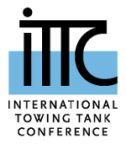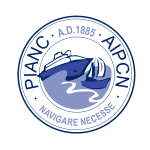Autonomous Inland Vessel
Inland navigation is facing new challenges: Problems with the new generation of skippers and crews, an increasingly fierce competition with other modes of transport and the need to reduce the carbon footprint. These factors lead, among others, to the fact that the mode of transport inland navigation has to increase efficiency and prospectively reduce personnel requirements in order to remain competitive.
Autonomes Binnenschiff
Die Binnenschifffahrt steht vor neuen Herausforderungen: Nachwuchsprobleme bei den Schiffsführern und der Besatzung, ein schärfer werdender Konkurrenzkampf mit anderen Verkehrsträgern und die Notwendigkeit, den ökologischen Fußabdruck zu verkleinern.
NOVIMAR – NOVel Iwt and MARitime transport concepts
Eine hohe Wettbewerbsintensität mit zunehmendem Kostendruck zählt zu den bedeutenden Herausforderungen in der Binnenschifffahrt. Dies gilt nicht zuletzt für Unternehmen mit kleineren Schiffseinheiten, die durch eine – im Vergleich zu großen Schiffseinheiten – relativ hohe Personalintensität gekennzeichnet sind und damit eine ungünstigere Kostenstruktur aufweisen.
NOVIMAR
A high level of competition with increasing cost pressure is one of the major challenges in inland navigation. This applies especially to companies with smaller vessels, which are characterised by a relatively high personnel intensity – compared to large vessels – and thus have a less favourable cost structure. However, small vessels are necessary because […]
DüPro – Systematische Untersuchung von Düsenpropellern für die Binnenschifffahrt
Das abgeschlossene Projekt „Bestimmung des effektiven Propellerzustroms für die Binnenschifffahrt“ zeigt deutlich, dass sich die Betriebsbedingungen der Antriebsorgane an verschiedenen Hinterschiffen und Wassertiefen extrem unterscheiden. In der modernen Binnenschifffahrt kommen überwiegend gemantelte Propeller als Propulsionsorgan zum Einsatz.
DüPro – Systematic investigation of ducted propellers for inland navigation
The completed project „Determination of the effective propeller inflow for inland navigation“ clearly shows that the operating conditions of the propulsion units on different aft ships and water depths are extremely different. In modern inland navigation, ducted propellers are mainly used as propulsion units. The design of the propulsion systems often appears to be motivated […]
DeConTrans begrüßt DeltaPort im Projektbeirat
Um mit der Wasserstraße als zuverlässigen und leistungsfähigen Verkehrsträger dem Verkehrsinfarkt auf der Straße entgegenzuwirken, begleitet die DeltaPort Niederrheinhäfen GmbH – ein Zusammenschluss der Häfen Rheinberg-Orsoy, Voerde, Wesel und Emmerich – von nun an das DST-Forschungsprojekt „DeConTrans – Innovative Konzepte für einen dezentralen Containertransport auf der Wasserstraße“.
DeltaPort joins DeConTrans Advisory Board
In order to strengthen inland waterways as a reliable and efficient mode of transportation and to mitigate the risk of a gridlock on the road, DeltaPort Niederrheinhäfen GmbH (DeltaPort Lower Rhine ports) – an association of the ports in Rheinberg-Orsoy, Wesel, Voerde-Emmelsum, and Emmerich – has decided to support the research project “DeConTrans – Innovative […]
Test and Control Centre Autonomous Inland Shipping
The set-up of the new Test and Control Centre Autonomous Inland Shipping at the DST Development Centre of Ship Technology and Transport Systems has begun in October 2019. The new centre is built by three research partners – DST, University of Duisburg-Essen, and RWTH Aachen University – and forms the essential research infrastructure for the […]
Versuchs- und Leitungszentrum Autonome Binnenschiffe
Ab dem 1. Oktober beginnt der Aufbau des neuen Versuchs- und Leitungszentrum Autonome Binnenschiffe am DST.



